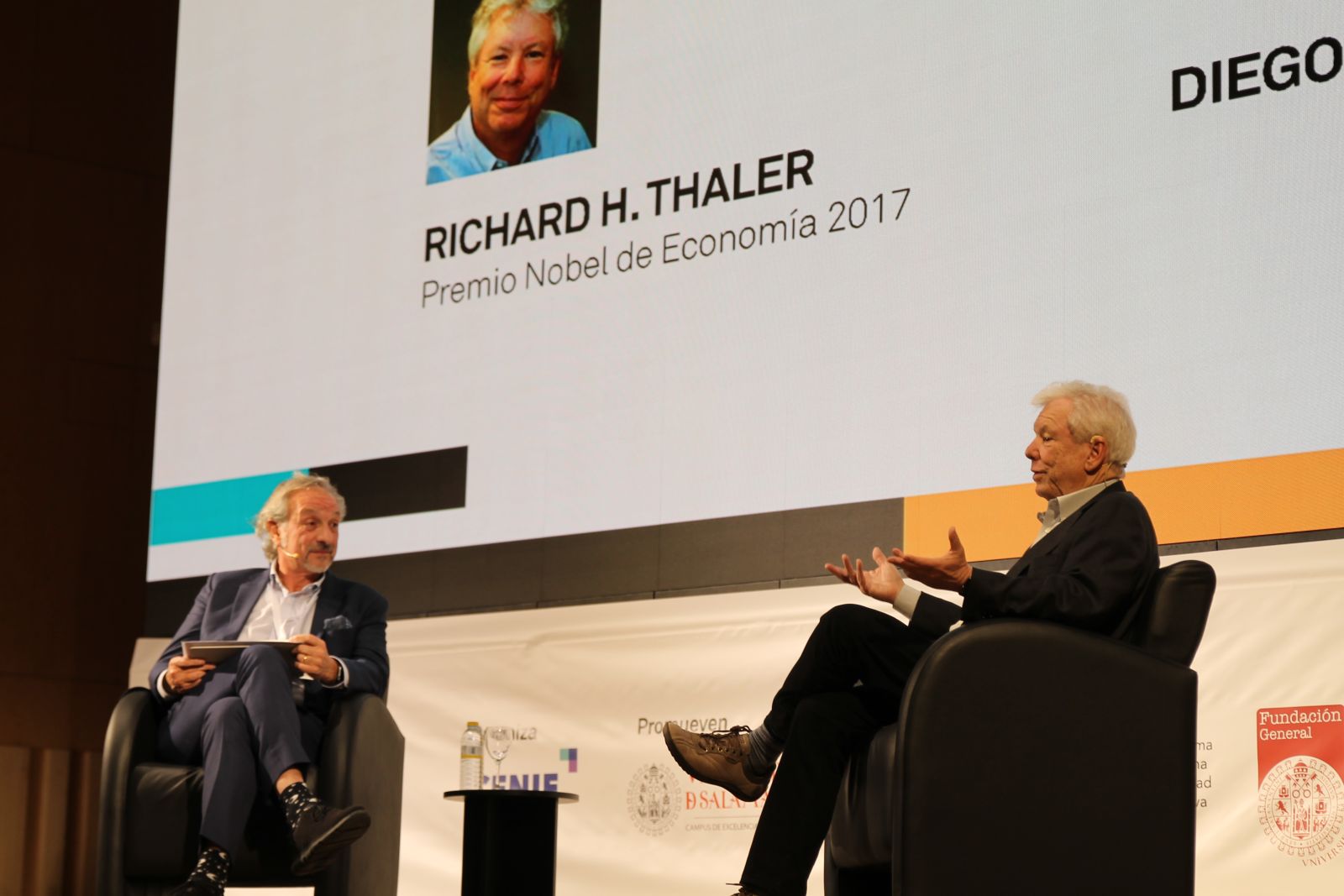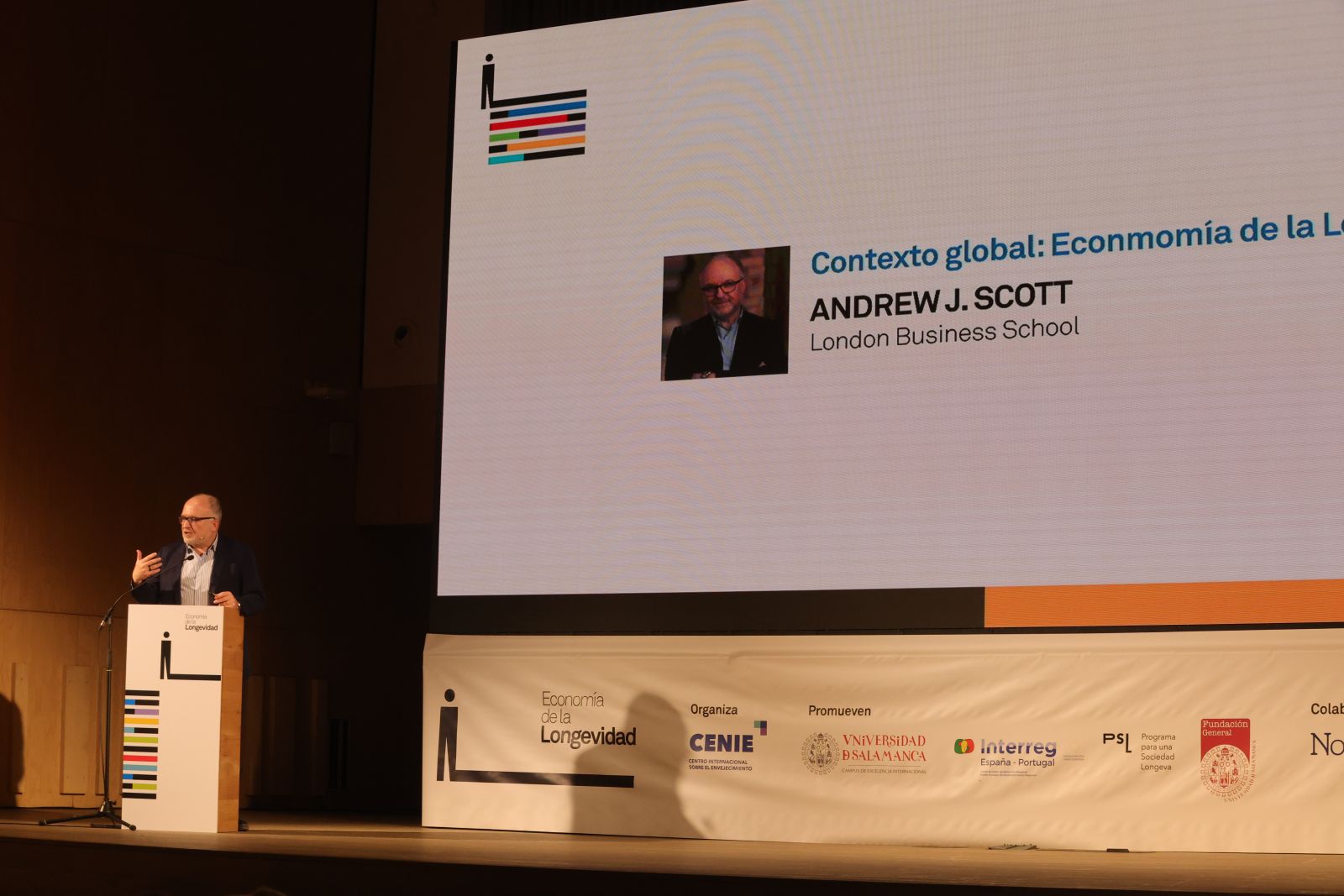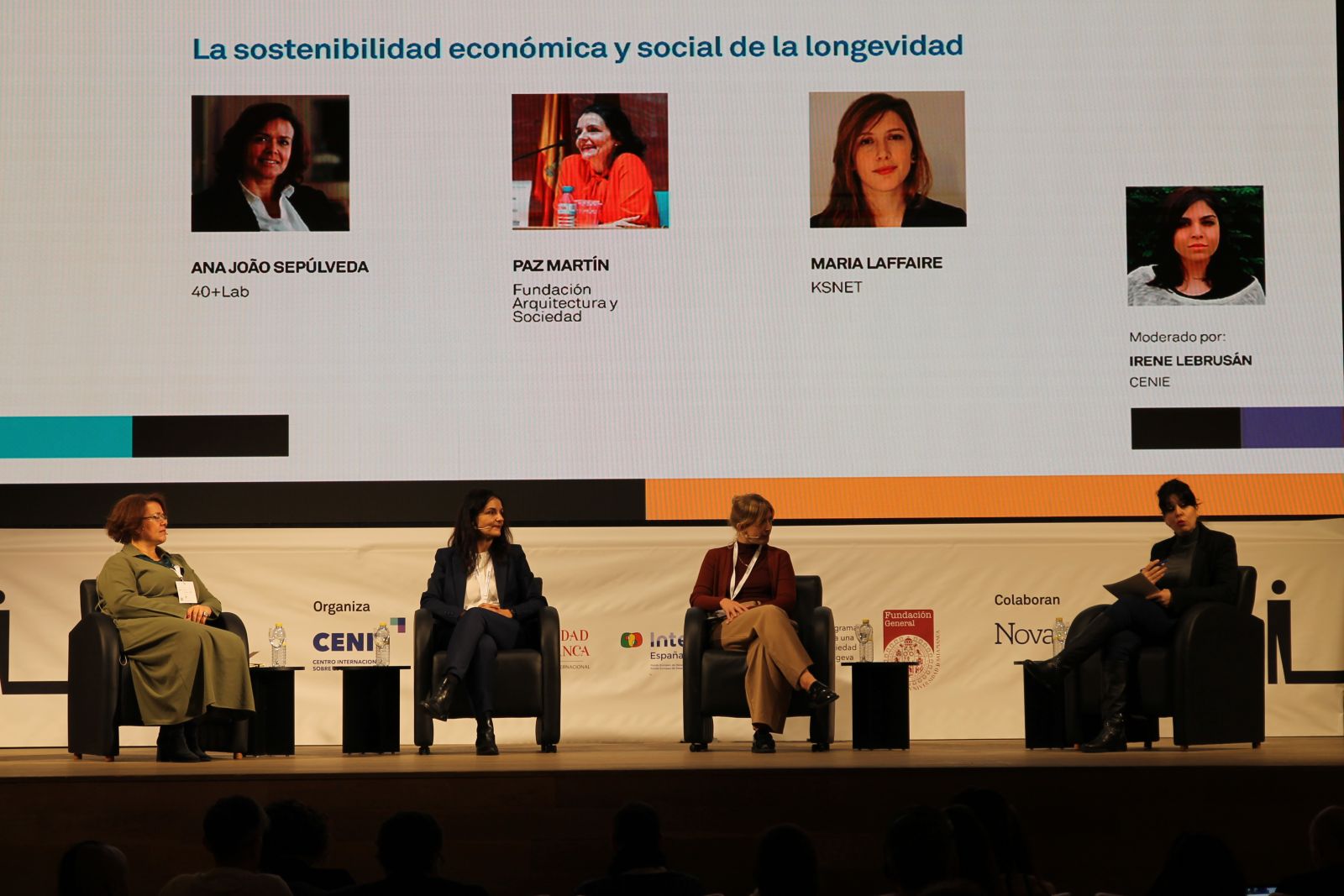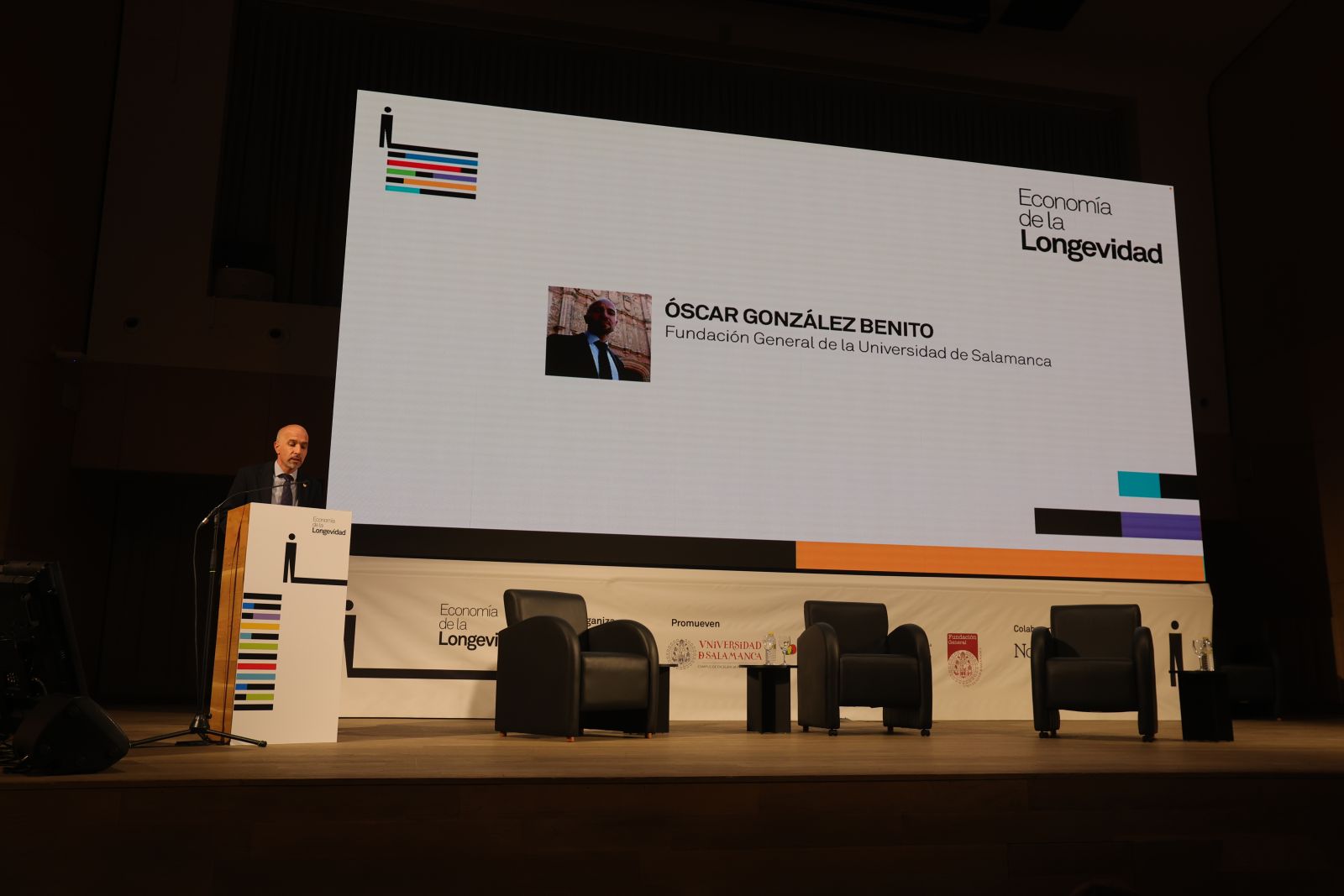Actividades
The International Congress on Longevity Economy lays the groundwork for dialogue on a new economic category


The international experts, gathered for two days at the International Congress on the Longevity Economy, promoted by the General Foundation of the University of Salamanca, through the International Centre on Ageing (CENIE), coincided in vindicating the economic aspect of longevity, due to its impact on present and future generations. The transformation of the work cycle, the demographic and territorial challenge, as well as the Sustainable Development Goals (SDGs) and the new societies were the focus of a lively and intense debate between world-class academics and researchers, which placed the Iberian Peninsula at the centre of the dialogue.
The Congress featured personalities from different areas of knowledge, including Richard H. Thaler, Professor of Behavioural Sciences and Economics at the Booth School of Business at the University of Chicago and 2017 Nobel Laureate in Economics, who debated with Diego Valero on the windows of opportunity that longevity opens up. The Nobel Laureate indicated that "we have the real capacity to moderate our future. What we have learned," he added, "is that we cannot simply tell people what to do and it is important to allow people to continue working. For his part, Valero, president of Novaster, stressed that "behavioural issues on behaviour are related to the big trends that are looming in the present: the fourth industrial revolution, the advent of technology, climate change and demographic evolution".
José Luis Escrivá, Minister for Inclusion, Social Security and Migration, was also present and highlighted the talent and experience of senior workers, which in his opinion "is being wasted". He also stressed that "it is very important to take measures to ensure that people who want to continue working at a certain age do not find it difficult to do so". In this respect, he stressed that the measures adopted within the framework of the latest pension reform in terms of delayed, early and forced retirement "have led to a 12% drop in early retirements, at the age of 61, and a 7% increase in retirements after the age of 65; all with positive incentives, without anyone taking any decisions they do not want to take".
On the same day, Andrew J. Scott, Professor of Economics at London Business School and Stanford University, said that "we need to achieve a longevity dividend in three dimensions: ensuring that the length of health matches the length of life, paying for longer life and creating the resources to finance it". Scott also argued that "we have to adapt to the new reality: we live and need a new life course".
Nicholas Barr, Professor of Public Economics at the London School of Economics, focused on the concept of longevity as the future of the young, not the present of the old. Barr proposed as a solution "investing in the skills of older people; you can have greater labour force participation at all ages".
Barr identified as the two main strategic challenges of the new longevity "the greater fluidity of labour markets and the ageing of the population, which has two pathways: declining fertility and increasing life expectancy, which has a huge welfare benefit. The result is problems in the financing of pensions".
Preventing inequalities
For Hervé Boulhol, Director of Employment, Labour and Social Affairs at the OECD, who spoke on the transformation of the work cycle and taking advantage of the opportunities of the new longevity, the determining factors in the employability of older people are education and health.
Boulhol stressed the need to "prevent inequalities before they worsen, to combat deep-rooted inequalities and to avoid those that occur at older ages when there is no longer time to anticipate them". He also questioned the retirement age, stating that "every year of increased life expectancy should mean an increase in the retirement age by eight months".
CENIE researcher Irene Lebrusán stressed that "we are going to have greater intergenerational coexistence with longer relationships". For her part, the Portuguese Ana João Sepúlveda, from 40+Lab, explained that "it is not possible to change demographics, so we must start with the economy", and warned of the need to "have a dual vision: of ageing and longevity".
In the opinion of Paz Martín, of the Fundación Arquitectura y Sociedad, "we cannot only think about housing for young people, as spaces are decisive for quality of life". Along the same lines, María Laffaire, researcher at KSNET, pointed out that "sustainability has to do with the effectiveness of the solutions that are proposed".
During the conversation on the Labour Challenges of the New Longevity, Concepción Galdón, professor at IE Business School, highlighted the productivity of older people: "longevity generates a type of employment that is not easy to automate; quality employment, intensive in empathy and creativity". At the same time, Martín Hermoso Fernández, representative of the UGT, warned of the difference in life expectancy according to per capita income. He also pointed out that "the labour market is characterised by a high level of discrimination against older people" and demanded that "the extension of working life should continue to be voluntary".
Finally, Pablo Antonio Muñoz Gallego, a lecturer at the Salamanca University, stressed the importance of "the work of the elderly" and said that "life expectancy means that people should work a few more years in an incentivised way, without wasting the capital they have".
Portugal's situation
In her online intervention, Isabel Ferreira, Secretary of State for Regional Development of Portugal, highlighted the value of holding the Congress, which "demonstrates the potential and urgency of this issue, for everyone, as a society". She also recalled that "Spain and Portugal are among the countries with the longest-living populations, so it is essential to take the necessary steps to build a true longevity economy, with a strategy, a new approach and a new economic category with all the opportunities it offers".
The director of the CSIC's Institute of Economics, Geography and Demography, Diego Ramiro Fariñas, and the deputy head of the European Commission's Directorate-General for Agriculture and Rural Development, María Gafo, reflected on the demographic aspect. In the words of Fariñas, "life expectancy in Europe has doubled in 120 years due to the decrease in infectious infant mortality". He also referred to predictions in this field: "there is no intrinsic limit to human life expectancy as a straight line of growth is drawn". Gafo said that "depopulation is not a new phenomenon in Spain, unlike in other areas of the European Union" and warned of the need to "create economic opportunities so that people can stay". To this end, he proposed as a solution "implementing policies to prevent and support the people who live in these areas through infrastructures so that children can stay".
Daniela Bas, Director of the Division for Inclusive Social Development of the United Nations Department of Economic and Social Affairs, who participated online, recalled that the longevity economy was first addressed by the United Nations in 1948, and that "the number of people over the age of 65 is expected to double in the coming decades". In his opinion, "there will be a change in consumption habits and there will also be changes in work due to higher productivity". "Older people are key elements in the agenda and play crucial roles in families, communities and political systems," Bas said.
Óscar González Benito, director of the General Foundation of the University of Salamanca, closed the International Conference on Longevity Economics and highlighted the value of these two days in which "factors for longevity to be compatible with economic well-being" were analysed.
The Conference on Longevity Economy is part of the INTERREG Programme, V-A, Spain-Portugal, POCTEP, 2014-2020, of the European Regional Development Fund (ERDF).




